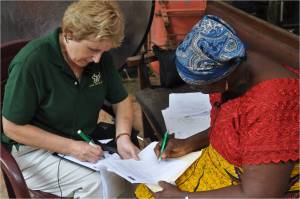The suffering of women at Asaba
From Liz Bird:

Before doing an interview, it's important to explain the informed consent process. All those who helped us were willing to have their images and words used to tell their stories to the world
While most of the massacre victims were men and boys, women suffered great heart-break and hardship, both in the immediate aftermath and in the long term. Women told us of searching for the bodies of their sons, husbands, and brothers, or wondering for years afterwards where they lay. They described dressing young boys as girls, so that the soldiers would not kill them, and disguising young women as mothers with children, to avoid assault by soldiers.
For girls and women faced an additional horror — rape and forcible marriages to soldiers, who took girls as young as 13 or 14 away from their families. Some who resisted were killed, as were men who tried to protect them. One lady described how soldiers came to her house and demanded the family give her up to them. She was forever grateful that her grandmother stood up to them, refusing to hand her over.
Many families, left fatherless, fled into the bush surrounding Asaba, or across the Niger bridge to Onitsha, in the territory known as Biafra. In this video clip, Mrs. Felicia Nwandu, about 15 at the time, describes seeing her uncle killed while he hid in a crawlspace in the ceiling. Her family fled, returning later to find their house burned down and all their possessions destroyed. The family subsisted on whatever they could forage, and many children went hungry.

This building, destroyed in the Civil War, is one of many in Asaba that has never been rebuilt, because of lack of resources
As she explains, the impact is still felt in Asaba more than 40 years later. Many children who would normally have received further education were unable to progress, and families that were once comfortable descended into poverty. We were shown buildings damaged or destroyed in the war that no-one has ever been able to repair. During this visit, we have particularly tried to learn about how the killings of so many males devastatated not only their immediate families, but also the long-term prospects for their descendants.
With all do respect and little knowledge on the organizations that do provide resources and help in various ways in many places in Africa, but I have noticed that I often read and see more about researchers and and reporters even photographers writing about the horrible events and situations, instead of help being provided. I guess that everyone has a job, even if it does not contribute directly to these victims, I just feel like there is something missing to help these poor people. I feel horrible just reading about it!